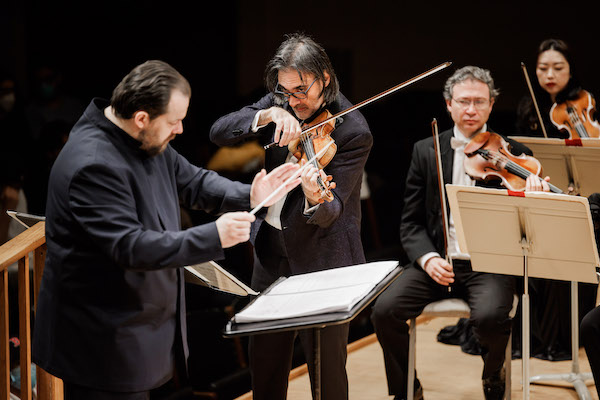Kavakos, Boston Symphony team up for thrilling U.S. premiere of Chin concerto

BSO music director Andris Nelsons and guest soloist Leonidas Kavakos performing the U.S. premiere of Unsuk Chin’s Violin Concerto No. 2 on Thursday night. Photo: Aram Boghosian
A week after presenting one of the season’s hardest-hitting programs, Andris Nelsons and the Boston Symphony Orchestra returned to Symphony Hall with something less fraught. Granted, Thursday evening’s lineup of pieces by Charles Ives, Unsuk Chin and Hector Berlioz wasn’t exactly a relaxing one. But it was attractive, especially for how it showcased the orchestra.
The BSO is often one of the most reliably persuasive new-music ensembles. So they proved again on Thursday in the American premiere of Chin’s Violin Concerto No. 2. Completed last year for violinist Leonidas Kavakos, the concerto subtitled “Scherben die Stille” (“Shards of Silence”) is a 27-minute tour de force the composer describes as a “portrait” and a “dialogue” with Kavakos’ musicianship.
High-flown appellation aside, Chin’s new concerto is a kaleidoscopic, shimmering essay that heads off in all sorts of directions and defies expectations as to where, exactly, it’s going to land. Built around a five-note motto that’s introduced by the soloist and, for the remainder of the piece, passed between and elaborated upon by violinist and orchestra, the score unfolds as a series of labyrinthine thematic transformations.
Chin’s writing is lucid and well-judged throughout. With its blend of harmonics, bariolage, soaring melodic lines and skittering toccata-like figurations, the solo part thoroughly exploits the instrument’s technical and expressive capabilities.
Though the orchestral forces are significant — the score calls for quintuple low brasses and more than three dozen percussion instruments — Chin has always handled her forces discreetly. Here, the full might of the ensemble is employed sparingly, with accompaniment often echoing or subtly framing the solo line.
Kavakos, for his part, was arguably flawless. That the violinist never seemed to break a sweat despite the music’s immense demands is a testament to the precision of Chin’s writing for him. He moved effortlessly between its many shifts of character, imbuing the score’s arpeggiated episodes and vaguely jazzy sequences with conspicuous zest.
For his part, Nelsons drew playing from the orchestra that impressed for both its textural sensitivity and stylistic assurance. Afterwards, the composer basked in the house’s fervent cheers.
More shouts followed the BSO’s performance of Berlioz’s Symphonie fantastique. Although Nelsons’ reading captured much of the hellish excitement that makes this 1829 score one of the freshest and weirdest pieces in the canon, his take was, in spots, frustratingly bombastic.
At least it began well: the first three movements sang with warmth and fluency. “Reveries, Passions” unfolded with fresh vigor, tight rhythms, and excellent balances. “A ball” tripped sweetly while the melodic shards of the “Scene in the country” came together with beguiling naturalness.
During the “March to the scaffold” and “Witches’ Sabbath,” though, interpretive rigor flagged. Brasses and percussion tended to dominate the fabric and obliterate any other goings-on. Also, there was little by way of progression toward climaxes; rather, one explosion followed another.
Granted, these two movements aren’t supposed to sound refined. And there were admirably colorful moments like the demonic brass exclamations and clean woodwind glissandos in the “Sabbath” introduction, and the snaky sul ponticello string articulations during the “Round Dance.” Still, given the taut shaping of what had come before, this later lack of nuance proved jarring.
No such issues emerged, though, in the dream-like traversal of Ives’ The Unanswered Question that opened the night. In it, the BSO honored the composer’s spatial intentions for the piece: strings were off-stage, four flutes were on it, and principal trumpet Thomas Rolfs sounded “the Perennial Question of Existence” from the back of the second balcony.
The results were hypnotic: like the rest of the night’s fare, this is music at once profound, visionary, and expressively direct.
The program repeats at 1:30 p.m. Friday and 8 p.m. Saturday at Symphony Hall. bso.org
Posted in Performances



